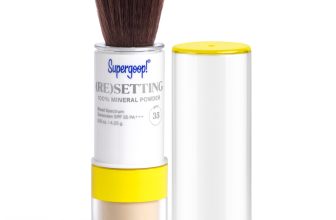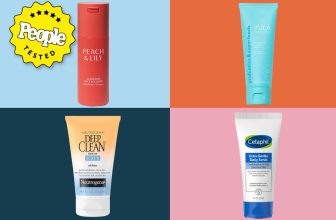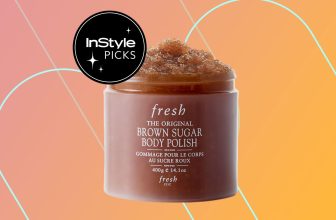Primer Or Sunscreen First
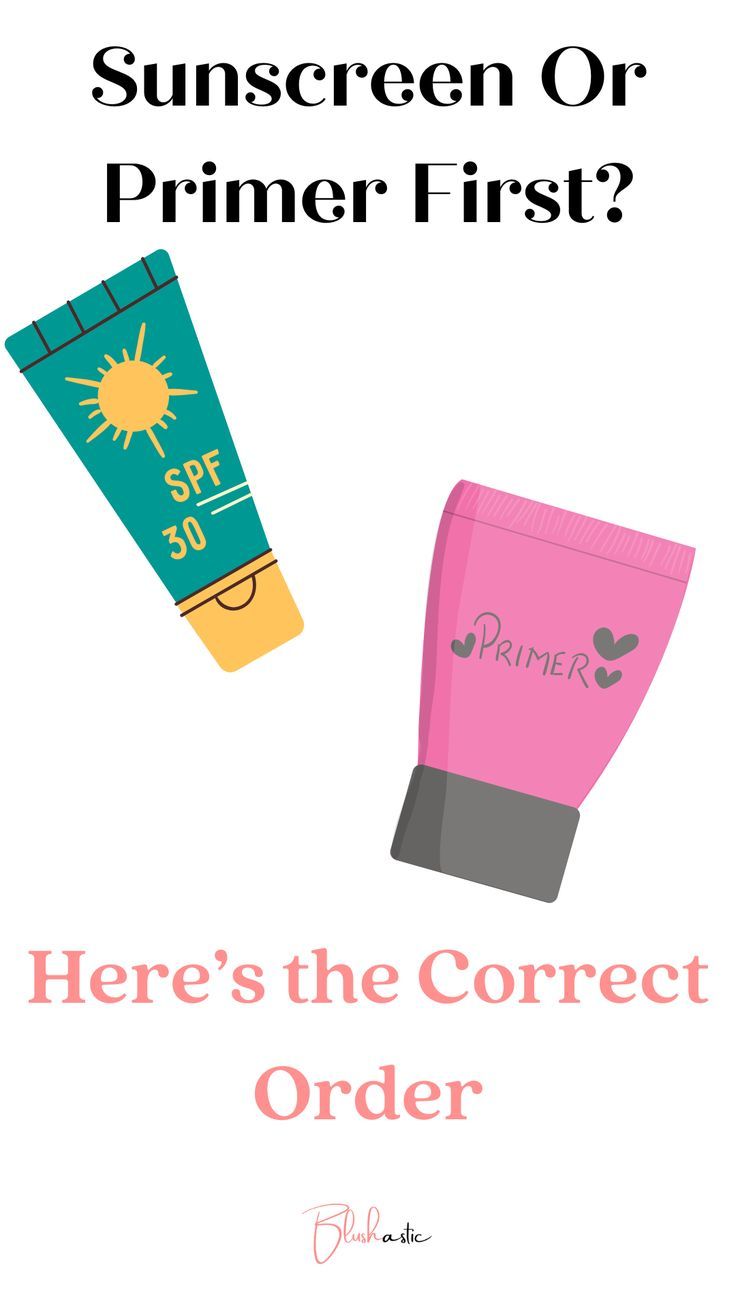
Apply sunscreen first before primer to ensure proper sun protection and smooth makeup application. This helps in preventing sun damage and maintaining a flawless makeup look throughout the day.
Primer Or Sunscreen First Integrating a high-quality sunscreen into your skincare routine is crucial for protecting your skin from harmful UV rays. By applying sunscreen before primer, you establish a shield against sun damage while creating a smooth base for makeup application. This dual approach not only safeguards your skin but also enhances the longevity and appearance of your makeup.
Understanding the correct order of application can optimize the benefits of both products, ensuring your skin remains protected and your makeup stays flawless.
Introduction To Skin Care Essentials
When it comes to taking care of your skin, it’s important to understand the essential components of a skincare regimen. The order in which you apply products, such as primer and sunscreen, can make a significant difference in the effectiveness of your skincare routine. In this blog post, we’ll explore the importance of skin protection and the basic components of a daily skincare regimen.
Importance Of Skin Protection
Protecting your skin from the harmful effects of the sun and environmental pollutants is crucial for maintaining healthy and youthful-looking skin. Exposure to UV rays can lead to premature aging, hyperpigmentation, and an increased risk of skin cancer. By incorporating sunscreen and primer into your daily routine, you can provide an added layer of protection against these damaging elements.
Basic Components Of A Daily Skin Care Regimen
Establishing a daily skincare regimen involves a few key components, including cleansing, moisturizing, and protecting the skin from the sun. By following a consistent routine and using products in the correct order, you can maximize the benefits of each product and maintain the overall health and appearance of your skin.

Credit: m.youtube.com
Understanding Sunscreen
Understanding sunscreen is crucial for achieving maximum protection against the harmful effects of the sun’s UV rays. While many people are familiar with the importance of using sunscreen, there is still some confusion about when to apply it. One common question is whether to apply primer or sunscreen first. In this section, we will focus on understanding sunscreen to help clear up any confusion and ensure you are applying it correctly.
Benefits Of Using Sunscreen
Using sunscreen provides numerous benefits for your skin and overall health. Here are some of the key advantages:
- Prevents sunburn: Sunscreen helps prevent sunburn by blocking UV rays from penetrating the skin.
- Reduces risk of skin cancer: Sunscreen can reduce your risk of developing skin cancer, including melanoma.
- Prevents premature aging: Exposure to the sun’s UV rays can cause premature aging of the skin, including wrinkles and age spots. Sunscreen helps prevent this damage.
- Protects against other skin damage: Sunscreen also helps protect against other types of skin damage, including sun allergies and discoloration.
Different Types Of Sunscreen
There are two main types of sunscreen: chemical and physical. Here’s a breakdown of each type:
| Chemical Sunscreen | Physical Sunscreen |
|---|---|
| Works by absorbing UV rays and converting them into heat | Works by reflecting UV rays away from the skin |
| Can be greasy and may cause irritation for those with sensitive skin | Tends to be less greasy and is generally better for sensitive skin |
| Usually needs to be applied 15-30 minutes before sun exposure | Can be applied immediately before sun exposure |
Regardless of which type of sunscreen you choose, it’s important to apply it correctly and reapply it every two hours or after swimming or sweating.
Exploring Primers
Role Of Primer In Makeup
Primer acts as a base for makeup, creating a smooth surface and helping makeup adhere better. It minimizes the appearance of pores and fine lines, giving a flawless finish to the skin.
Varieties Of Primer For Different Skin Types
There are various types of primers designed for different skin types. For oily skin, oil-control primers help to reduce shine. For dry skin, hydrating primers provide a moisture boost. For combination skin, a mattifying primer for the T-zone and a hydrating primer for the rest of the face can be used. For sensitive skin, a silicone-free and fragrance-free primer is recommended to prevent irritation.

Application Techniques
Application techniques for primer and sunscreen are crucial for effective protection and flawless makeup application. When it comes to primer or sunscreen first, the order of application can impact the overall look and longevity of your makeup.
Best Practices For Applying Sunscreen
- Choose a broad-spectrum sunscreen with at least SPF 30.
- Apply sunscreen as the last step of your skincare routine.
- Use a nickel-sized amount to cover your face and neck.
- Reapply sunscreen every two hours, especially when outdoors.
Tips For Applying Primer Effectively
- Opt for a primer that suits your skin type and concerns.
- Apply a pea-sized amount of primer evenly on your face.
- Focus on areas with enlarged pores or fine lines.
- Allow the primer to set for a few minutes before makeup application.
Layering Skin Care Products
When it comes to layering skin care products, the order in which you apply them can impact their effectiveness. Which Comes First: Primer or Sunscreen?
Which Comes First: Primer Or Sunscreen?
Primer or sunscreen first? Always apply sunscreen before primer to protect your skin from UV rays.
How Layering Affects Skin Protection And Makeup Durability
Layering affects skin protection and makeup durability. Sunscreen shields skin, while primer enhances makeup longevity.
Expert Advice
When it comes to skincare, the debate about whether to apply primer or sunscreen first has been ongoing. To shed light on this dilemma, we’ve sought expert advice from dermatologists and makeup artists to provide you with the best recommendations and insights.
Dermatologists’ Recommendations
Dermatologists unanimously agree that sunscreen should always be the first layer applied to the skin. This is because sunscreen serves as a protective barrier against harmful UV rays, preventing premature aging and skin damage. By applying sunscreen first, you ensure that your skin is shielded from potential sun damage throughout the day.
Makeup Artists’ Insights
From a makeup perspective, primer is designed to be applied after sunscreen. It acts as a base for foundation, helping it adhere better to the skin and ensuring a smoother application. Makeup artists emphasize the importance of allowing the sunscreen to be fully absorbed before applying primer, as this allows for optimal makeup application and longevity.
Addressing Common Concerns
When applying makeup, it’s crucial to consider the order of primer and sunscreen. To ensure maximum protection, apply sunscreen before primer. This allows the sunscreen to form a protective barrier, while the primer smooths the skin for flawless makeup application.
Addressing Common Concerns: Primer Or Sunscreen First When it comes to applying makeup, the order in which you apply products can make a big difference in the overall look and feel of your skin. One common question that arises is whether to apply primer or sunscreen first. In this article, we’ll address some common concerns to help you make an informed decision. Impact on Acne-Prone Skin For those with acne-prone skin, the thought of layering multiple products can be daunting. However, both primer and sunscreen serve important purposes in your skincare routine.
If you have oily or acne-prone skin, it’s best to apply a lightweight, oil-free sunscreen first. Allow it to absorb completely before applying a non-comedogenic primer to smooth out your skin’s texture and create a perfect base for your makeup. Dealing with Oily or Dry Skin Types If you have oily skin, you may be hesitant to add more products to your already shiny complexion. However, a mattifying primer can help control oil production and keep your makeup in place throughout the day. If you have dry skin, it’s important to choose a hydrating primer that will provide a smooth, moisturized base for your makeup. In either case, it’s best to apply your sunscreen first to ensure adequate protection.
Frequently Asked Questions
Do You Put Sunscreen On Before Or After Primer?
Apply sunscreen before primer to protect your skin from harmful UV rays. Sunscreen is a must for skin protection.
What To Apply First, Primer Or Moisturizer Or Sunscreen?
Apply moisturizer first, then sunscreen, and finally primer for the best results. Moisturizer hydrates the skin, sunscreen provides sun protection, and primer helps makeup last longer.
What Order Do You Apply Makeup With Sunscreen?
After applying sunscreen, start with primer, then foundation, followed by concealer, blush, eyeshadow, eyeliner, mascara, brows, and lip products.
What Comes First, Sunscreen Or Moisturizer?
Apply moisturizer first, then sunscreen to protect and hydrate your skin effectively.
Conclusion
Whether to apply primer or sunscreen first depends on your skin’s needs. Always prioritize sunscreen for protection. Understand your skin type and choose products accordingly. Experiment with different routines to find what works best for you. Consistency and proper skincare routine are key for healthy, glowing skin.



